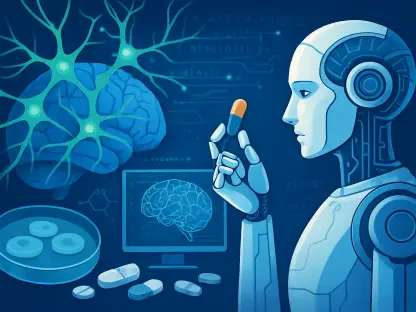Imagine a world where artificial intelligence (AI) in health care can diagnose diseases with pinpoint accuracy, yet for certain communities, these tools consistently deliver flawed results due to hidden biases in the data they rely on. This stark contrast between potential and reality underscores a pressing challenge in modern medicine: ensuring AI serves everyone equitably. The transformative power of AI in health care is undeniable, from streamlining diagnostics to personalizing treatments, but the risk of perpetuating inequities through biased datasets looms large. Addressing this issue is not just a technical necessity but a moral imperative, as biased AI can worsen patient outcomes and erode trust in medical technology among marginalized groups. This analysis delves into the emerging trend of AI equity tools, spotlighting innovations like AEquity, their real-world applications, expert insights on overcoming challenges, and the broader implications for the future of equitable health care delivery.
The Rise of AI Equity Tools in Health Care
Growing Awareness of Bias in AI Systems
The adoption of AI in health care has surged over recent years, with systems now integral to tasks like disease prediction and treatment planning. However, alongside this growth, a troubling trend has emerged: many AI models are trained on datasets that fail to represent diverse populations adequately. Studies published in prominent journals have shown that demographic imbalances in health care data—such as underrepresentation of racial minorities or socioeconomic groups—can lead to skewed AI outputs, resulting in misdiagnoses or unequal treatment recommendations for certain communities.
These biases are not just theoretical; they have tangible consequences. For instance, research indicates that some AI-driven diagnostic tools perform less accurately for patients from underrepresented groups, with error rates significantly higher compared to majority populations. This discrepancy highlights a critical need for solutions that address bias at the data level, ensuring that AI does not reinforce existing disparities in health outcomes but instead promotes fairness across all patient demographics.
The urgency to tackle this issue is reflected in the increasing focus on equity within the health care tech sector. Stakeholders, from developers to policymakers, are recognizing that without intervention, AI risks becoming a tool that benefits some while neglecting others. This growing awareness has spurred the development of specialized tools designed to detect and mitigate biases, marking a pivotal shift toward more inclusive health care technology.
Real-World Innovations: AEquity as a Leading Example
Among the most promising innovations in this space is AEquity, a tool developed by researchers at a leading medical institution. Designed to identify and correct biases in health care datasets, AEquity stands out for its versatility across various data types, including medical imaging and patient records. By analyzing these datasets before they are used to train AI models, the tool helps prevent biased outputs that could lead to inequitable care.
AEquity’s practical impact is evident in its ability to uncover both overt and subtle disparities in data, such as differences in how conditions are represented across demographic groups. Once identified, the tool facilitates corrective measures, enabling developers to adjust datasets and improve the fairness of AI-driven decisions. This dual function of detection and mitigation positions AEquity as a game-changer for algorithm developers and health systems aiming to build trust in their technologies.
Beyond its technical capabilities, the application of AEquity in real-world settings demonstrates its potential to reshape health care delivery. From pre-deployment audits to ongoing fairness assessments, the tool offers a framework for ensuring AI systems work effectively for all patients, not just those overrepresented in historical data. This innovation exemplifies how targeted solutions can address systemic challenges, paving the way for broader adoption of equity-focused practices in the industry.
Expert Perspectives on AI Equity Challenges and Solutions
Insights from Industry Leaders
Leading voices in health care and technology stress the urgency of confronting dataset bias to achieve equitable AI outcomes. Girish N. Nadkarni, MD, MPH, a prominent researcher, argues that unaddressed biases in data undermine the very purpose of AI in medicine, which is to enhance care for every patient. He emphasizes that tools like AEquity are vital but must be part of a larger strategy that includes rethinking how data is collected and interpreted.
David L. Reich, MD, another key figure in health system leadership, echoes this sentiment, highlighting the importance of community trust in AI technologies. According to Reich, addressing bias at the foundational level—within the datasets themselves—is essential for fostering confidence among diverse populations who may already be skeptical of medical advancements. His perspective underscores that equity in AI is not just a technical goal but a societal one, tied to broader health outcomes.
Balancing Technical and Systemic Approaches
Experts also agree that while innovations like AEquity are critical, they cannot stand alone. There is a strong consensus on the need for systemic changes alongside technical solutions, such as updating data collection practices to ensure greater representation of underrepresented groups. This combined approach aims to create a feedback loop where fairer data leads to fairer AI, ultimately benefiting patient care on a wide scale.
Moreover, specialists in the field point out that building equitable AI requires continuous collaboration between technologists, clinicians, and regulators. This multidisciplinary effort ensures that tools are not only developed with equity in mind but are also implemented in ways that address real-world disparities. Such insights reveal a nuanced understanding of the challenge, where technology serves as a starting point for deeper structural reforms in health care.
Future Implications of AI Equity Tools in Health Care
Scaling Adoption and Integration
Looking ahead, tools like AEquity are poised for wider adoption across health systems, potentially becoming standard in AI development pipelines. Their integration into regulatory frameworks could further ensure that equity remains a priority, with guidelines mandating bias audits before AI tools are deployed in clinical settings. This trend toward standardization reflects a growing recognition of equity as a non-negotiable aspect of health care technology.
The anticipated benefits of such tools are substantial, particularly for underrepresented groups who stand to gain from improved diagnostic accuracy and treatment recommendations. However, challenges remain, including the need for regular updates to address newly emerging biases as data and populations evolve. Keeping pace with these changes will be crucial to maintaining the effectiveness of equity tools over time.
Broader Impact on Health Care Delivery
Beyond technical advancements, the rise of AI equity tools could transform health care into a learning system that continuously adapts to prioritize fairness. This shift promises to enhance patient outcomes by ensuring that AI supports all communities equitably, rather than perpetuating historical inequities. Yet, there is a risk of over-reliance on technology without addressing underlying systemic issues, which could limit the long-term impact of these innovations.
Additionally, the broader societal implications of equitable AI are significant. By fostering trust in medical technology, these tools can encourage greater engagement with health care services among skeptical or marginalized populations. This potential to bridge gaps in access and care highlights the far-reaching effects of equity-focused innovations, provided they are supported by comprehensive strategies that tackle both data and delivery challenges.
Reflecting on the Path Forward for Equitable Health Care AI
Looking back on the discussions, the journey toward equitable AI in health care reveals both remarkable progress and persistent hurdles. The emergence of tools like AEquity marks a turning point, offering concrete ways to detect and mitigate biases in datasets that once threatened to undermine AI’s promise. Expert insights further illuminate the dual need for technical innovation and systemic reform, ensuring that solutions address root causes rather than just symptoms.
Moving forward, stakeholders are encouraged to prioritize collaborative efforts, uniting developers, health care providers, and policymakers in a shared mission. Investing in diverse data collection and embedding equity tools into standard practices emerge as actionable next steps to sustain momentum. By focusing on these strategies, the health care sector can build on past lessons to create AI systems that truly serve every patient, reinforcing trust and fairness as cornerstones of medical advancement.









